Unit 9 What does he look like? Section A Period2课件 (共14张PPT)
文档属性
| 名称 | Unit 9 What does he look like? Section A Period2课件 (共14张PPT) |  | |
| 格式 | ppt | ||
| 文件大小 | 668.0KB | ||
| 资源类型 | 教案 | ||
| 版本资源 | 人教新目标(Go for it)版 | ||
| 科目 | 英语 | ||
| 更新时间 | 2023-06-09 06:29:23 | ||
图片预览

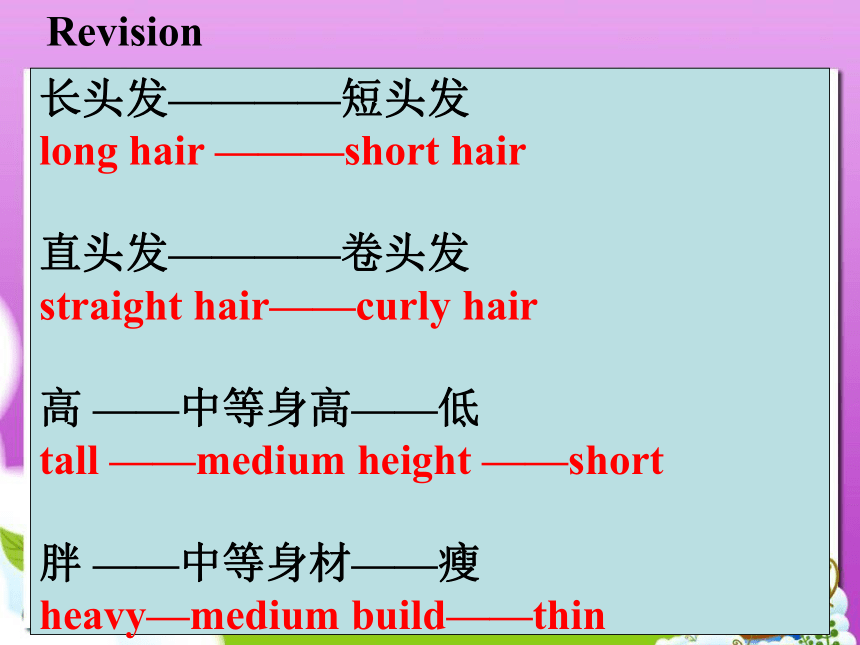
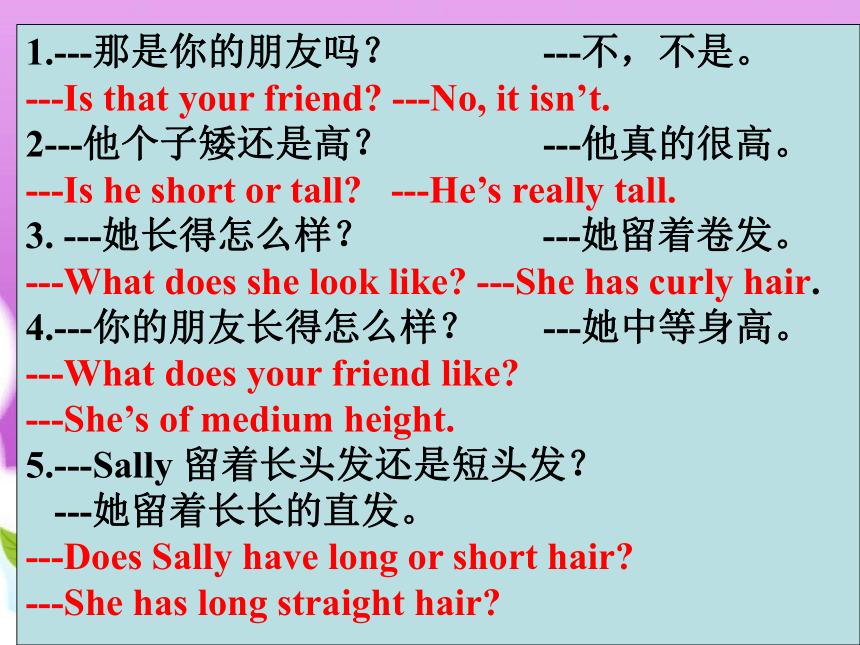
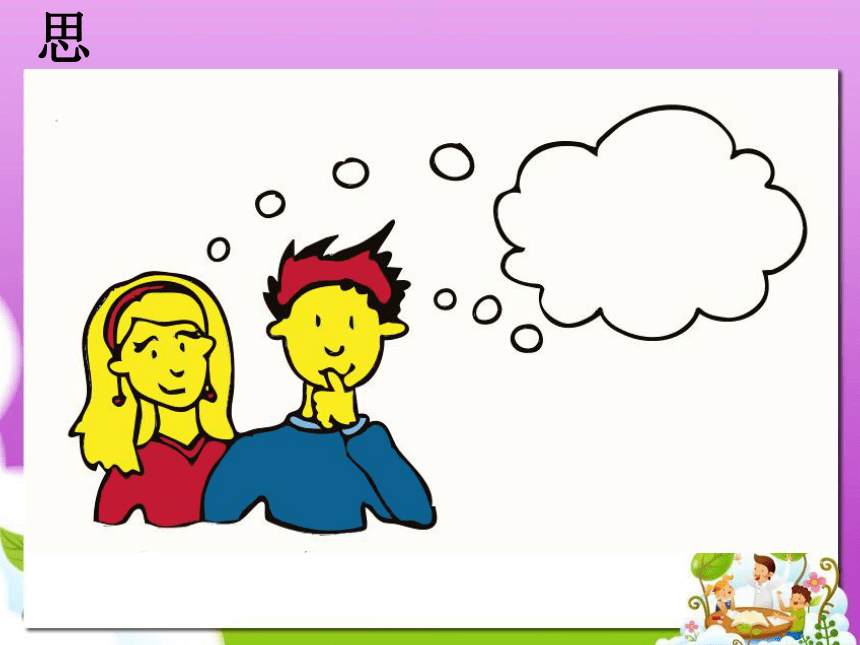

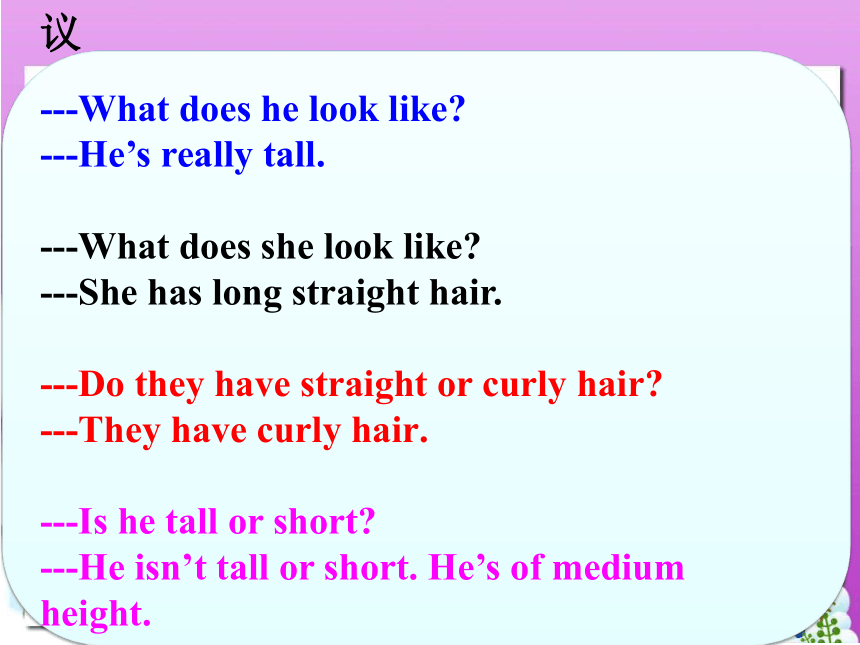
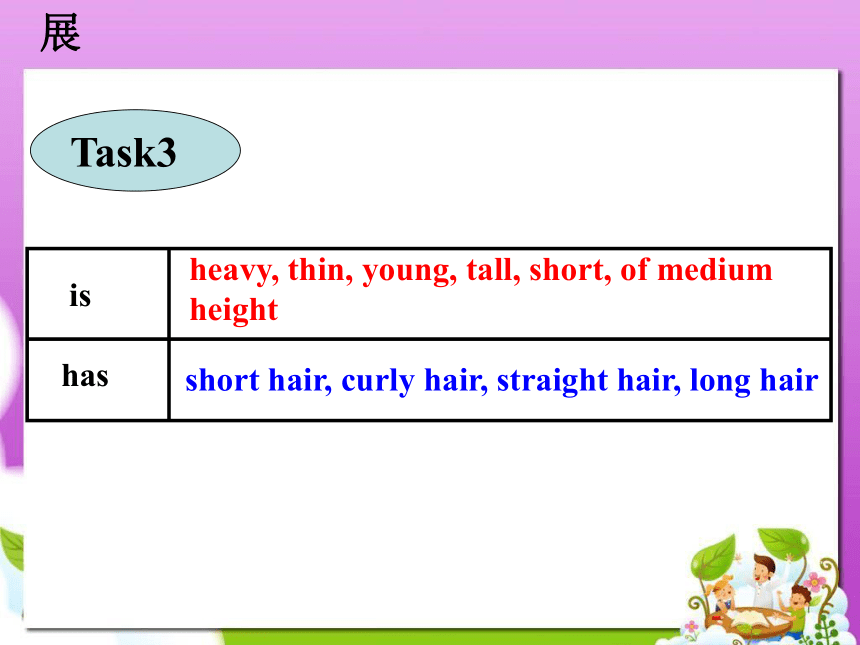
文档简介
(共14张PPT)
Unit9
Revision
长头发————短头发
long hair ———short hair
直头发————卷头发
straight hair——curly hair
高 ——中等身高——低
tall ——medium height ——short
胖 ——中等身材——瘦
heavy—medium build——thin
1.---那是你的朋友吗? ---不,不是。
---Is that your friend ---No, it isn’t.
2---他个子矮还是高? ---他真的很高。
---Is he short or tall ---He’s really tall.
3. ---她长得怎么样? ---她留着卷发。
---What does she look like ---She has curly hair.
4.---你的朋友长得怎么样? ---她中等身高。
---What does your friend like
---She’s of medium height.
5.---Sally 留着长头发还是短头发?
---她留着长长的直发。
---Does Sally have long or short hair
---She has long straight hair
思
议
Are you going to the movie tonight
We’re meeting at seven, right
I may be a little late.
My friend David is going, too.
Just meet him in front of the cinema first.
I don’t know him.
Well, he has brown hair and wears glasses.
See you later then.
议
---What does he look like
---He’s really tall.
---What does she look like
---She has long straight hair.
---Do they have straight or curly hair
---They have curly hair.
---Is he tall or short
---He isn’t tall or short. He’s of medium height.
展
is
has
heavy, thin, young, tall, short, of medium height
short hair, curly hair, straight hair, long hair
Task3
A: So what ________your friend Clark look like
B: Well, he _______thin, and he _________ black
hair.
A: Really _________ he tall or short
B: He _______ tall or short. He________ of medium
build.
A: Does he_________ curly or straight hair
B: He_________ straight hair. And he ________
really handsome.
do /does
is /has
have/ has
is /does
is/isn’t
is /has
has/ have
is/ has
is /has
Task4
1. Are you going to the movie tonight 今晚你要去看电影吗
1)现在进行时表将来:
它常表最近或较近的将来,所用动词多是位移动词。
如:arrive,go,come,leave,start,meet,fly 等。
(1)_________. 我要走了。
(2)______________.我要来了
(3) When ____you_________ 你什么时候离开?
2) go to the movie 去看电影
3) tonight adv.(在)今晚,(常与将来时连用)
n. 今晚
Are you free________ 今晚你有空吗
I’m going
I’m coming
are
leaving
tonight
评
2. but I may be a little late. 但是我可能晚一点儿。
1)may v. 可能 may +v原形
(1) It may____ in your pencil-box. 它可能在你的铅笔盒里。
(2) He may ____a teacher. 他也许是位老师。
2) a little +adj./adv. = kind of /a (little) bit +adj./adv.有点儿……
It’s ______cold today. 今天有点冷。
a little +n. (u) 有一点儿 little +n. (u) 表否定,几乎没有
a few +n-s 有几个 few +n-s 表否定,几乎没有
There is _____milk in the fridge.冰箱里还有一点牛奶。
There is_____ milk in the fridge.冰箱里几乎没有牛奶了。
She has ______friends. 她有一些朋友。
She has ______friends. 她几乎没有朋友。
some
be
be
a little
a little
little
a few
few
4. He has brown hair and wears glasses.
他的头发是棕色的而且戴着眼镜。
wears glasses 戴着眼镜
wear v. wear+衣服、鞋子、眼镜等
可表示“戴着眼镜”, “蓄着……样的头发”, “穿着……样的衣服”
wear 表示经常性的状态, put on表示穿的动作。
wear用进行时态时表示短时间内的状态。
e.g. 1) She ______sports shoes every day.她每天穿运动鞋。
2) Mr. Brown ______glasses.布朗先生戴着眼镜。
3)Miss Li __ _______a new dress today. 李老师今天穿着一件新裙子。
glasses 眼镜 a pair of glasses
glass n.(可数) 玻璃杯->pl. glasses n.(不可数) 玻璃
e.g. 1) Tom always wears__________________.
2) Be careful of the_____.小心玻璃。
3) There are two _______of water on the table.
wears
wears
is wearing
glass
glasses
a pair of glasses
3. He isn’t tall or short. 他不高也不矮。
英语的否定句中连词or代替and。
I don’t have any brothers _____sisters.
我没有兄弟姐妹。
She can sing ___dance.
她会唱歌和跳舞。
She can’t sing _____dance.
她不会唱歌和跳舞。
or
and
or
Sum up
What does he/she look like
He/She
has short/long hair.
has straight/curly hair.
is tall/short.
is medium height.
is fat/heavy/thin/of medium
height.
wears / is wearing a hat . wears/ is wearing glasses.
Unit9
Revision
长头发————短头发
long hair ———short hair
直头发————卷头发
straight hair——curly hair
高 ——中等身高——低
tall ——medium height ——short
胖 ——中等身材——瘦
heavy—medium build——thin
1.---那是你的朋友吗? ---不,不是。
---Is that your friend ---No, it isn’t.
2---他个子矮还是高? ---他真的很高。
---Is he short or tall ---He’s really tall.
3. ---她长得怎么样? ---她留着卷发。
---What does she look like ---She has curly hair.
4.---你的朋友长得怎么样? ---她中等身高。
---What does your friend like
---She’s of medium height.
5.---Sally 留着长头发还是短头发?
---她留着长长的直发。
---Does Sally have long or short hair
---She has long straight hair
思
议
Are you going to the movie tonight
We’re meeting at seven, right
I may be a little late.
My friend David is going, too.
Just meet him in front of the cinema first.
I don’t know him.
Well, he has brown hair and wears glasses.
See you later then.
议
---What does he look like
---He’s really tall.
---What does she look like
---She has long straight hair.
---Do they have straight or curly hair
---They have curly hair.
---Is he tall or short
---He isn’t tall or short. He’s of medium height.
展
is
has
heavy, thin, young, tall, short, of medium height
short hair, curly hair, straight hair, long hair
Task3
A: So what ________your friend Clark look like
B: Well, he _______thin, and he _________ black
hair.
A: Really _________ he tall or short
B: He _______ tall or short. He________ of medium
build.
A: Does he_________ curly or straight hair
B: He_________ straight hair. And he ________
really handsome.
do /does
is /has
have/ has
is /does
is/isn’t
is /has
has/ have
is/ has
is /has
Task4
1. Are you going to the movie tonight 今晚你要去看电影吗
1)现在进行时表将来:
它常表最近或较近的将来,所用动词多是位移动词。
如:arrive,go,come,leave,start,meet,fly 等。
(1)_________. 我要走了。
(2)______________.我要来了
(3) When ____you_________ 你什么时候离开?
2) go to the movie 去看电影
3) tonight adv.(在)今晚,(常与将来时连用)
n. 今晚
Are you free________ 今晚你有空吗
I’m going
I’m coming
are
leaving
tonight
评
2. but I may be a little late. 但是我可能晚一点儿。
1)may v. 可能 may +v原形
(1) It may____ in your pencil-box. 它可能在你的铅笔盒里。
(2) He may ____a teacher. 他也许是位老师。
2) a little +adj./adv. = kind of /a (little) bit +adj./adv.有点儿……
It’s ______cold today. 今天有点冷。
a little +n. (u) 有一点儿 little +n. (u) 表否定,几乎没有
a few +n-s 有几个 few +n-s 表否定,几乎没有
There is _____milk in the fridge.冰箱里还有一点牛奶。
There is_____ milk in the fridge.冰箱里几乎没有牛奶了。
She has ______friends. 她有一些朋友。
She has ______friends. 她几乎没有朋友。
some
be
be
a little
a little
little
a few
few
4. He has brown hair and wears glasses.
他的头发是棕色的而且戴着眼镜。
wears glasses 戴着眼镜
wear v. wear+衣服、鞋子、眼镜等
可表示“戴着眼镜”, “蓄着……样的头发”, “穿着……样的衣服”
wear 表示经常性的状态, put on表示穿的动作。
wear用进行时态时表示短时间内的状态。
e.g. 1) She ______sports shoes every day.她每天穿运动鞋。
2) Mr. Brown ______glasses.布朗先生戴着眼镜。
3)Miss Li __ _______a new dress today. 李老师今天穿着一件新裙子。
glasses 眼镜 a pair of glasses
glass n.(可数) 玻璃杯->pl. glasses n.(不可数) 玻璃
e.g. 1) Tom always wears__________________.
2) Be careful of the_____.小心玻璃。
3) There are two _______of water on the table.
wears
wears
is wearing
glass
glasses
a pair of glasses
3. He isn’t tall or short. 他不高也不矮。
英语的否定句中连词or代替and。
I don’t have any brothers _____sisters.
我没有兄弟姐妹。
She can sing ___dance.
她会唱歌和跳舞。
She can’t sing _____dance.
她不会唱歌和跳舞。
or
and
or
Sum up
What does he/she look like
He/She
has short/long hair.
has straight/curly hair.
is tall/short.
is medium height.
is fat/heavy/thin/of medium
height.
wears / is wearing a hat . wears/ is wearing glasses.
同课章节目录
- Unit 1 Can you play the guitar?
- Section A
- Section B
- Unit 2 What time do you go to school?
- Section A
- Section B
- Unit 3 How do you get to school?
- Section A
- Section B
- Unit 4 Don't eat in class.
- Section A
- Section B
- Unit 5 Why do you like pandas?
- Section A
- Section B
- Unit 6 I'm watching TV.
- Section A
- Section B
- Review of Units 1-6
- Unit 7 It's raining!
- Section A
- Section B
- Unit 8 Is there a post office near here?
- Section A
- Section B
- Unit 9 What does he look like?
- Section A
- Section B
- Unit 10 I'd like some noodles.
- Section A
- Section B
- Unit 11 How was your school trip?
- Section A
- Section B
- Unit 12 What did you do last weekend?
- Section A
- Section B
